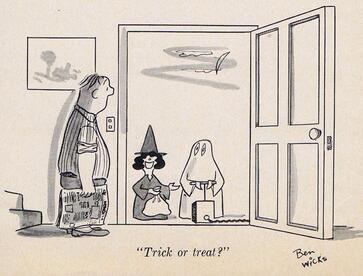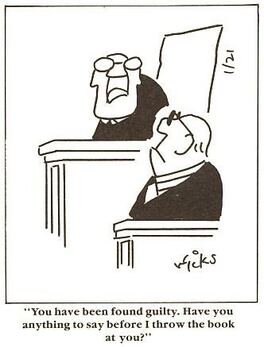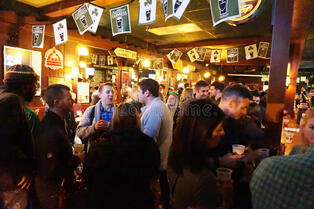
Remember Ben Wicks? A well-known cartoonist of his time, he died in Toronto, 2000. His obituary describes him as a British-born Canadian cartoonist, illustrator, journalist and author.
I also recall him as owner of The Ben Wicks pub on Parliament Street in Toronto’s Cabbagetown. (New owners took over the pub in 2013. A blue plaque commemorating Wicks has been installed on the railing and a wall-sized outdoor cartoon by Wicks has been retained.)
In our very long interview, Ben Wicks described his personal roller coaster ride to success.
“I grew up on Fleet Street (London, England). My father was a printer. My mother, a charlady at The London Times.” He admitted talking about his childhood was unsettling and “very emotional”.
“In the London of that day, things were bad. I had a twin brother who died 3 ½ days after we were born. There was no money.” An undertaker who knew the Wicks family offered to bury his brother by lying the child between the legs of a deceased woman in a closed coffin. His parents accepted the offer.
London’s children---and Wicks was one of them---were evacuated during this time. “From this warm, close family,” he recounted, “I was forced to go on a train to Wales. I was twelve. Having never left home before, it was pretty traumatic.”
Standing in the station where the exiled children were delivered, “we stood there while families picked us out. A miner and his wife who had no children chose me.”
But the union didn’t work and after a few months, “I was sent back and the village smithy picked me up.”
The rejection, suffering, confusion and emotional stress of that awful experience still haunted the Ben Wicks I met.
“You have to be prepared when luck comes along”
Which brings us to his start in cartooning.
With only a few lines and a related caption, Ben Wicks could create an instant, effective and timely message. What was even more amazing was how he produced his cartoons a month in advance.
Each morning, he claimed, he read the wire service (remember, these are pre-online days!). He credited his ‘excellent nose’ for news, a helpful ability since he filed current stories that he felt would still be topical in a few months’ time.
By his own admission, Ben Wicks held some 32 odd jobs (among them clogmaker, barrow boy, electrician’s mate, and a musician aboard the Queen Elizabeth liner) since leaving school at 14.
The turning point came in 1960 while he worked as a milkman in Calgary. “We lived in a one room flat and I was home from my milk route at noon. So, I bought this book on cartooning….” And in it he discovered a list of markets.

“It was a hobby,” said Wicks. “I mailed 6 cartoons to the Saturday Evening Post planning to mail them out again to other markets as soon as they were returned.”
Fake Letters
But the Post liked his work and offered him a contract. However, since he was an unknown, they asked for three letters of reference.
“I faked the letters,” chuckled Wicks, “and drew for the Post for two years. Strictly gag jokes.”

Acting on a colleague’s advice, Wicks then moved to Toronto to work for the Toronto Telegram from where his cartoon, The Outcasts, was soon syndicated in over 50 newspapers. He drew his witty cartoons in a simple style that became popular with readers. When the Telegram ceased to be in 1971, he was picked up by the Toronto Star.
At the height of its popularity, the daily Wicks cartoon was carried by 84 Canadian, and more than 100, American newspapers.

He was always interested in, and advocated, for children. His book, “No Time To Wave Goodbye”, highlights selected accounts from more than two million children under the age of thirteen who were displaced from London during World War II. The book is a traumatic reminder of his own childhood.
In 1986, he was made a Member of the Order of Canada.
Wicks was also known for his humanitarian work. He used his illustrations to publicize the plight of civilian sufferers of the Biafran War in Nigeria, and became a supporter of Oxfam.
The Ben Wicks Pub
One of his last words to me, after our fascinating and marathon interview, was “when you come to Toronto, stop by the Pub. Ask for me. If I’m there, it would be great to see you again.”
We did. My husband and I stopped into his pub on Parliament Street. Some time later.
And, as genial as ever, he greeted us warmly.
But he had no idea who I was.
 RSS Feed
RSS Feed